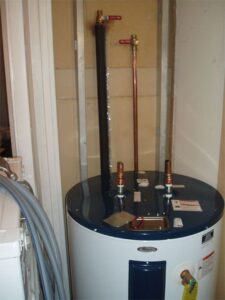How Does Corrosion Affect Water Quality?
Corrosion is a common yet often overlooked issue in plumbing systems and water heaters. It occurs when metal reacts with water and oxygen, leading to rust and deterioration. While it may seem like a purely structural problem, corrosion significantly impacts water quality, affecting its taste, appearance, and safety. Understanding the link between corrosion and water quality is essential for maintaining a healthy home environment.
If you suspect corrosion in your plumbing or water heater, contacting a professional for water heater installation in Carlsbad or an emergency plumber in Carlsbad can help resolve the issue effectively.

What Is Corrosion and Why Does It Occur?
Corrosion is the gradual breakdown of metals due to chemical reactions with their environment. In plumbing systems, it often occurs when water flows through metal pipes or interacts with metal components in water heaters. Factors that contribute to corrosion include:
- Water Acidity (Low pH): Acidic water speeds up the corrosion process.
- Oxygen Levels: Higher oxygen content in water increases the likelihood of rust formation.
- Water Temperature: Hot water accelerates corrosion, making water heaters especially vulnerable.
- Type of Metal: Galvanized steel and cast iron are more prone to corrosion than copper or stainless steel.
Effects of Corrosion on Water Quality
Corrosion doesn’t just damage pipes and water heaters; it directly impacts the quality of the water flowing through them. Here’s how:
1. Discoloration of Water
Rust particles from corroded pipes or tanks can mix with water, giving it a reddish or brownish tint. This discoloration is not only unpleasant to see but can stain fixtures, laundry, and dishes.
2. Metallic Taste
Corrosion can release metal ions like iron, copper, or lead into the water, altering its taste. Metallic-tasting water is a clear sign that your plumbing system may be corroded.
3. Health Hazards
Certain metals released during corrosion, such as lead, pose severe health risks. Consuming lead-contaminated water can lead to developmental issues in children and health complications in adults.
4. Reduced Water Flow
Corroded pipes often have a buildup of rust and mineral deposits, which restrict water flow. This can lead to inconsistent water pressure and reduced efficiency in your plumbing system.
5. Damage to Appliances
Corrosion in water heaters can lead to sediment buildup, reducing efficiency and shortening the appliance’s lifespan. If your water heater shows signs of corrosion, you might need a professional service for water heater installation in Carlsbad to prevent further water quality issues.
How to Address Corrosion and Protect Water Quality
Preventing and managing corrosion is essential to maintaining clean, safe water. Here are some effective steps:
1. Test Your Water
Testing the pH and mineral content of your water can help identify conditions that promote corrosion. A professional plumber can conduct these tests and recommend appropriate solutions.
2. Upgrade Your Plumbing System
Older pipes made of galvanized steel or iron are more prone to corrosion. Replacing them with corrosion-resistant materials like copper or PEX can significantly improve water quality. A local emergency plumber in Carlsbad can assist with pipe replacements.
3. Install a Water Softener
Hard water contributes to scale buildup and corrosion. A water softener can reduce mineral content and protect your plumbing system.
4. Regular Maintenance
Flushing your water heater annually helps remove sediment and rust, extending its lifespan and maintaining water quality. Professional maintenance services, like those provided by emergency plumbers in Carlsbad, ensure your water heater stays in optimal condition.
5. Use Corrosion Inhibitors
Adding corrosion inhibitors to your water supply can protect metal surfaces inside pipes and appliances. These are particularly useful in areas with naturally acidic or corrosive water.
6. Consider a New Water Heater
If corrosion has significantly damaged your water heater, replacing it is often the best option. Modern water heaters are designed to resist corrosion and offer better energy efficiency. For expert water heater installation in Carlsbad, consulting a professional ensures a hassle-free upgrade.
When to Call a Professional
Corrosion in plumbing systems and water heaters can escalate quickly, leading to costly repairs and unsafe water. Signs like discolored water, unusual taste, or reduced water pressure warrant immediate attention. A skilled emergency plumber in Carlsbad can identify the cause and recommend effective solutions, whether it’s pipe replacement, water heater repair, or system upgrades.
Conclusion
Corrosion is a silent but serious issue that affects both the functionality of plumbing systems and the quality of water. From rusty water and metallic taste to potential health hazards, the effects of corrosion should not be underestimated. Taking proactive steps like regular maintenance, system upgrades, and professional services can help protect your water quality and your home.
If you suspect corrosion in your plumbing or water heater, don’t wait for the problem to worsen. Contact a Carlsbad plumber for expert advice and solutions, whether it’s for routine maintenance, pipe replacement, or a new water heater installation in Carlsbad. Safeguarding your water quality starts with addressing corrosion at its source.
- Bathroom Remodel
- DIY
- Garbage Disposal
- Home Improvement
- How To Install
- Hydro Jetting
- Kitchen Remodel
- Plumbing
- Plumbing Services
- Professional Plumber
- Slab Leak
- Tips
- Toilet Installation
- Toilet Repair
- Toilets
- Uncategorized
- Unclog Drain
- Water Heater Installation
- Water Heater Maintenance
- Water Heater Repair
- Water Shut-Off Valve